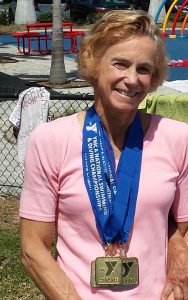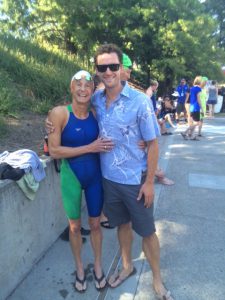High Performance Parallels: A Sit-Down with Swimming Record Holder Joan Pfinsgraff
RESOURCE LIBRARY

 A topic that often surfaces during an Olympic games is the subject of excellence, of high performance, especially the parallel between the sport itself and the determination and skills of the athletes. As I thought about who could really speak to this topic, one person in particular came to mind. Medical pro, trainer, and world-class swimmer, Joan Pfinsgraff. She has excelled both professionally and athletically, with a long and impressive career in the medical field and as a distinguished and well-decorated swimmer. In fact, she was ranked #1 in the world for her age group in the 200 backstroke and 200 IM (individual medley) in 2014 at the age of 60. Just last year, she set five national records at the YMCA Masters National Championships. I asked her some specific questions about high performance in business and athletics, and here’s what she said:
A topic that often surfaces during an Olympic games is the subject of excellence, of high performance, especially the parallel between the sport itself and the determination and skills of the athletes. As I thought about who could really speak to this topic, one person in particular came to mind. Medical pro, trainer, and world-class swimmer, Joan Pfinsgraff. She has excelled both professionally and athletically, with a long and impressive career in the medical field and as a distinguished and well-decorated swimmer. In fact, she was ranked #1 in the world for her age group in the 200 backstroke and 200 IM (individual medley) in 2014 at the age of 60. Just last year, she set five national records at the YMCA Masters National Championships. I asked her some specific questions about high performance in business and athletics, and here’s what she said:
What’s one of the biggest obstacles you’ve faced in your career?
Probably the biggest obstacle I have faced in my swimming career is believing in myself. When I was young, my father was always my truest believer and he could get me to believe that I could do things I didn’t think possible. When he became ill and could no longer fulfill that need, I struggled. A trip to the National Championships really opened my eyes. I was awestruck by what I perceived as the enormity of the meet and wondered how I got there, while swimmers who had achieved no more than I had expected to be there and compete well. That’s when I realized how important confidence and a positive attitude are to performance.
What leadership lessons can you only learn in the pool?
I have always reveled in the way one good swimmer spawns many more. You can see it at the Olympics when a country excels at events in which their best swimmer competes, but fails to have anyone among the top 5 swimmers in other events. Top swimmers are not afraid to be leaders. They are not afraid of competition but instead help and root for their teammates to succeed. In turn, teammates gain confidence, improve, recognize, and finally develop talents they see in their leader. It’s that sense of knowing that when one achieves all can achieve — and together they can forge a winning team – that makes a leader and a winner.
What’s one fact people are surprised to learn about the sport?
Swimming appears to be a very boring, individual sport: Practices involve staring at a line on the bottom of the pool or at a ceiling beam for hours on end; and the only team events are relays. But, in reality, the camaraderie of swimming long, arduous hours with like-minded individuals is a group lesson in perseverance, commitment, and shared accomplishment. Teammates often become friends and confidants for life.

What kind of overlap do you see between corporate leadership and the sport of swimming?
The sport of swimming teaches swimmers to be self-reliant and take responsibility for results. There are no “bad” refs, no “biased” coaches, and no politics in swimming. The fastest time always wins. There is no talking your way onto an elite team or relay. When swimmers fail to attain a goal, they are forced to get back in the pool and create a plan to improve. Corporate leadership should be the same. When results don’t meet expectations, effective leaders are self-reliant, take personal responsibility, don’t make excuses, and don’t blame others. Instead, they objectively seek to understand the failure and make constructive plans to improve.
With the Olympics here, what can “every day” people learn from these top-tier athletes? How can leaders emulate that spirit to coach their people into entirely new levels of skill?
I am always bemused by the attitudes and perceptions of elite athletes when they are interviewed. When they have won, they often identify a few flaws in their performance knowing that they can still do better. But, after losing, they often identify the positives in their performance and vow to build on those for the next event. In short, whether winning or losing, they have a plan and believe in themselves. Leaders need to do the same. An effective leader believes in the team, works to understand what went right and what went wrong, and builds a plan to succeed.
How have you grown as a professional through your career working with and competing against elite athletes?
It seems that no matter how healthy our lifestyles, both our minds and bodies decline over time. As a “youngster,” whether it was in the pool or at work, I sought to excel as compared to my peers by working harder and longer. As we age, we are forced to compete against people both younger and older than we are. We must work or work-out smarter when longer and harder may no longer be possible. Elite athletes can often extend their careers by recognizing and accepting the decline but developing methods to optimize their talents. Continued success in work or sport requires finding efficiencies, considering mind and body as a whole, planning and working toward difficult yet attainable goals.
What is your advice to people – either in the medical, athletic, or leadership field as a whole – as they take on bigger and badder challenges (like, say, trying out for the Olympics or going after a big swimming title)?
Don’t expect continual progress. There will be dips and downturns along the way. Accept these as part of the (ad)venture and move on. Assess failures, address inefficiencies, update plans, and if you ever ask yourself “Why am I doing this?” the answer is, “because I can.”
If you had a life motto, what would it be?
Enjoy and appreciate every moment.
Who inspires you and why?
My husband Marty is a wonderful inspiration to me. His attitude toward life is always optimistic and he sees the best in everyone. Sometimes I tell him to take off his rose-colored glasses! But it is that positive outlook that keeps people young and allows them to work constructively with others to accomplish great things.
If you could have lunch with one leader in the business world, who would it be with? What one question would you ask?
Politically incorrect or not, I would love to meet Ivanka Trump! I would have a million questions, from how she balances everything in her life to how she copes with the attacks on her family. But, if I only get one question, I would ask: “What do you hope is your greatest accomplishment during your father’s tenure as president?”
What do you always have to have near you during business hours?
Family pictures.
Droid or iPhone? Mac or PC?
I have never been a big Apple fan because their products seem to be overpriced, but our kids got me an iPhone for Christmas and I have to say, it is very nice.
Coke or Pepsi?
I have always loved Coke, but can’t remember the last time I had one. Too many carbs for this old body.
Best place to vacation?
Boca Grande, Florida
What snack can you simply not live without?
Peanut butter. It’s good on everything.
What’s on your iPod right now?
I don’t have an iPod, but I just bought a couple CDs entitled “A Kiss is Still a Kiss: Great Romantic Memories in Song.” I love sappy, crooning music.
Biggest Pet Peeve?
Not speaking your mind.
What’s something about you that people are surprised to find out?
I’m embarrassed to say I am a pretty boring person – not much in the way of surprises. I fit the 70’s adage, “What you see is what you get.”
If you could time travel, what would you want to say to the college-age you?
Although I recognized then that college would always be a special treasure in my life, as I reconnect with college friends and acquaintances, I realize that there were many individuals who were treasures as well. If I had it to do again, I would work to better appreciate those individuals and find more of those individual treasures.
One piece of advice for young, aspiring leaders:
Think of others at least as often as you think of yourself in all aspects of your job. During negotiations, always view the discussion from the other point of view as well and as often as your own; think of career opportunities for others as often as you strive for your own upward mobility; celebrate others’ accomplishments as you relish your own; and recognize that everyone has occasional personal difficulties that may interfere with job performance.
What’s a lesson that you had to learn the hard way?
I didn’t realize that taking time off from my career would make it extremely difficult to reenter the market. Compounding my problem was my age and the need for meticulous documentation of continuing education. Bottom line: network and stay engaged to be certain you will be able to reenter the workforce until and unless you are sure you are retired. Aging, unknown employees are never an employer’s first choice.
If you suddenly had to start over with a new career, what would you pursue?
I love medicine so I am not sure I would change my basic career path, but I would pursue an MD/PhD or MD/engineering degree and go into research. I would be very excited to work with a small company to develop medical products for unmet medical needs.
What’s an opportunity you missed that you regret?
The opportunity to pursue medical research could have been achieved before or after a medical residency or fellowship and added little or no time to my training.
